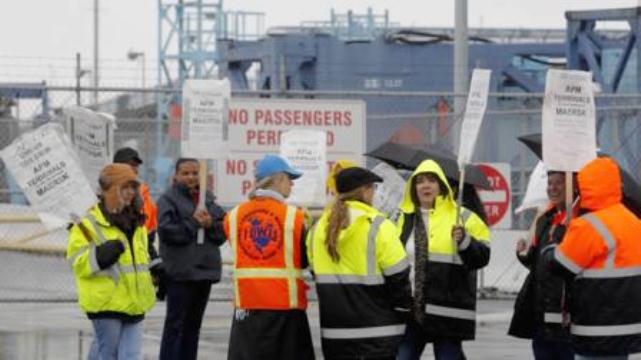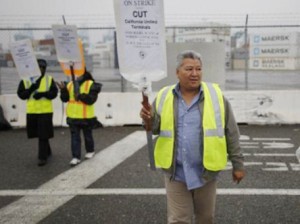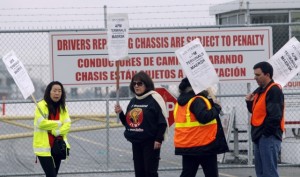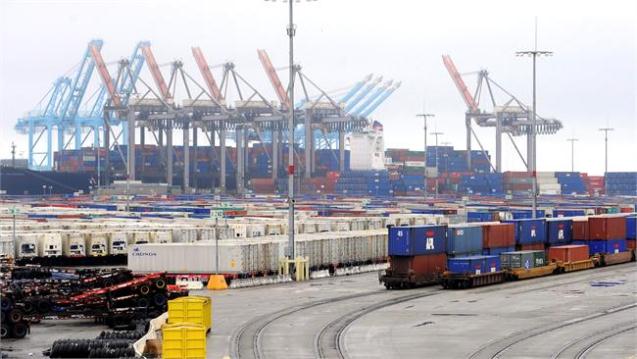By Christopher Palmeri & Mary Jane Credeur – Nov 30, 2012 9:38 AM ET
Bloomberg Business Week
(VOD–the strike continues as of today, Dec. 3, 2012. Workers say they are “entitled” to their jobs, which are being outsourced. Detroit Mayor Dave Bing told CNN the problem in Detroit is that city workers feel “entitled” to their jobs–apparently LA workers know what to do about that.)
California ports handling about a third of U.S. container shipments were largely closed because of a strike, stranding vessels carrying last-minute cargos for the holiday-shopping season.
Seven of eight terminals at the Port of Los Angeles are shut, Phillip Sanfield, a spokesman for the city-owned facility, said yesterday. At the adjacent Port of Long Beach, three of six are closed, according to its website. Clerical workers walked out Nov. 27 amid an impasse in contract talks, and longshoremen represented by the same union refused to cross the picket lines.
The strike will disrupt shipments of clothes, furniture, electronics and other Asia-made goods during the year’s busiest shopping period. The National Retail Federation trade group asked President Barack Obama to intervene, saying a 10-day West Coast ports lockout in 2002 cost the economy about $1 billion a day and disrupted supply chains for as long as six months.
“It’s a logistics nightmare,” said John C. Martin, an economist at Martin Associates in Lancaster, Pennsylvania. “The problems mount exponentially the longer this goes on.”
If the strike lasts, ships will start diverting to Oakland, California, or Seattle, causing backups there as railroads, truckers and warehouse operators handle a surge in volume, Martin said. Perishables such as fruits and vegetables may begin to rot, and shipping lines will have to spend as much as $70,000 more a day to operate vessels, he said in a telephone interview.
Holiday-Shopping
The strike comes after the peak of the holiday-shopping cargo rush, Sanfield said. Still, some deliveries are yet to be made, said Stanley Shen, a spokesman for Orient Overseas (International) Ltd. (316) The Hong Kong-based container line’s Long Beach terminal has been closed by the walkout.
“The Long Beach strike took us by surprise,” he said.“It will have tremendous disruption for all the Christmas shipments that are yet to arrive and be unloaded.”
Hanjin Shipping Co., whose Long Beach terminal closed yesterday, is still assessing the impact on operations, said Sonya Cho, a spokeswoman for the Seoul-based shipping line.
Los Angeles has 10 vessels at berth waiting to be serviced and more anchored nearby, according to Sanfield.
“We rarely have ships waiting, and more are due every day,” he said by phone.
Trucking companies and Union Pacific Corp. (UNP) and Burlington Northern Santa Fe, the two biggest western U.S. railroads, haul cargos from the California ports to destinations across the country.
‘Bargaining Table’
Los Angeles Mayor Antonio Villaraigosa sent a letter to the International Longshore & Warehouse Union, which represents the clerical workers, and the Los Angeles/Long Beach Harbor Employers Association, which negotiates for shippers, urging them to reach an agreement.
“The City of Los Angeles needs both of you to get back to the bargaining table this week, to work with a mediator, and to hammer out a settlement before further harm is done to our local economy,” Villaraigosa said. “There is no time to waste.”
Port Executive Director Geraldine Knatz echoed that call yesterday in a statement urging both sides to return to negotiations.
“We are starting to see ships divert to other ports, including to Mexico,” she said. “This dispute has impacted not only our port workforce but all stakeholders who ship goods through our complex.”
No Contract
The employers said in an update on the strike that clerical workers rejected a proposed increase in compensation to more than $190,000 in wages and benefits.
The 800 office and clerical employees have been working without a contract for 30 months, according to a statement on the union website.
Salaries aren’t the issue, the union said. More than 51 positions have been lost in recent years because of outsourcing to other locations including Costa Rica and Dallas, according to the statement.
The shippers say no clerical jobs have been sent overseas or elsewhere. The employers say they have offered protection against such actions.
“The real purpose behind this claim is to promote‘featherbedding’ — requiring employers to call in temporary employees and hire new permanent employees even when there is no work to perform,” the employers said in their statement.
Craig Merrilees, a spokesman for the longshoremen, said two of the 14 terminal operators working at the ports had signed agreements with the union and their facilities were operational. The two are Stevedoring Services of America and Pasha Stevedoring & Terminals.
Asked how long the strike would proceed, he said: “It will go on until the companies honestly face the issue of outsourcing and keep good jobs at home.”
Fourteen ports on the U.S. East Coast and Gulf Coast, including New York and New Jersey, may also face a strike in January if a new contract with the International Longshoremen’s Association isn’t reached by year-end. The Federal Mediation and Conciliation Service is involved in those discussions.
To contact the reporter on this story: Christopher Palmeri in Los Angeles at cpalmeri1@bloomberg.net; Mary Jane Credeur in Atlanta at mcredeur@bloomberg.net








